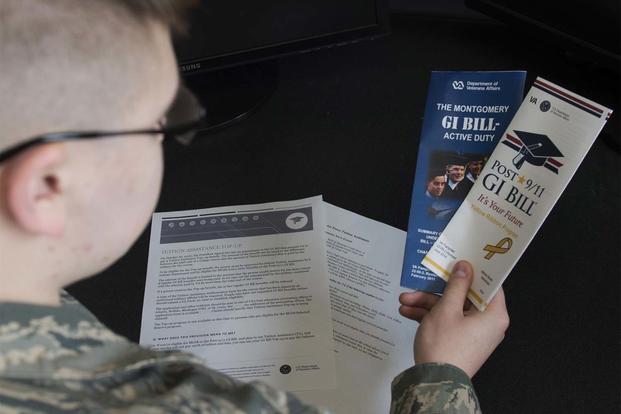A top official with the Department of Veterans Affairs told lawmakers his main concern regarding a major post-9/11 GI Bill expansion package is that the agency will not have the technology to support the upgrades.
"Probably my biggest concern is two words: 'IT,' " Curtis Coy, deputy under secretary for economic opportunity at the VA, told lawmakers. "Much or almost all of these sections require some changes in our IT system."
Coy spoke on Capitol Hill on Monday at a late evening House Committee on Veterans Affairs hearing on a bipartisan package that would give the post-9/11 GI Bill a series of major upgrades.
Among the 28 changes included in the legislation is the removal for future troops of a 15-year use-it-or-lose-it rule, and a change that gives the full benefit to Guard and Reserve troops who are involuntarily activated.
It also includes a measure making Purple Heart recipients eligible for the education benefits no matter how long they served on active duty. That change could impact almost 700 troops a year, proponents said.
The bill also restores some lost benefits to troops who attended now defunct for-profit schools. And it allows survivors of troops killed in action who are using the benefit under the Fry Scholarship to qualify for the Yellow Ribbon program, which helps convert the benefit to cover the cost of private colleges and universities.
The legislation has the strong support of a parade of veteran service organizations (VSOs) including the Veterans of Foreign Wars, Student Veterans of America and the American Legion.
The organizations were part of a large group of VSOs helping lawmakers develop the series of proposals that were rolled into the current legislation. Known as the "Harry W. Colmery Veterans Educational Assistance Act of 2017," the title pays homage to the late American Legion national commander who wrote the original GI Bill in 1944.
Coy's words of caution about the VA's ability to administer the changes were among the few departures from praise for the measure during the hearing. Coy emphasized that Congress should consider tech support for the changes at the VA, as well as staffing and funding.
Others who testified noted the need for even further expansions to the provision that helps veterans hurt by the closure of for-profit schools. The included change restores benefits lost for only the month the school shut down -- not all benefits lost by the closure. As written, if a veteran used six months of his benefit for the now-defunct school, five months would still be lost forever under the change, while one month would be restored. Yet students using other types of public funding, such as Pell Grants, have their full funding restored in that situation, veteran advocates noted.
"We think veterans should be able to recoup their months of eligibility at the closed schools," Patrick Murray, an associate legislative director for the Veterans of Foreign Wars, told the committee. "GI bill eligibility should be allowed to be recouped, and student veterans deserve the same equality as every other student affected by school closures."
The committee plans to finish its work on the legislation this week and send it to the House floor, where it is expected to pass easily. Senate staffers said they expect similar legislation to be introduced soon in the Senate.
"Senator [Johnny] Isakson is working closely with his Senate colleagues on companion GI Bill legislation," said a spokesperson for Isakson, a Georgia Republican who chairs the Senate Committee on Veterans' Affairs. "We are hoping to introduce soon."
-- Amy Bushatz can be reached at amy.bushatz@military.com.





























